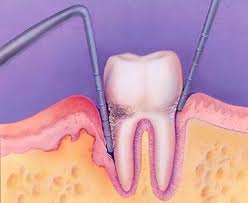 Research has consistently shown a correlation between gum disease and diabetes. In fact, periodontal disease is actually included on the list of complications associated with diabetes.
Research has consistently shown a correlation between gum disease and diabetes. In fact, periodontal disease is actually included on the list of complications associated with diabetes.
The exact mechanism is unknown, but experts suspect that diabetics are more likely to have periodontal disease because they are more susceptible to inflammation and infections than people without diabetes are.
At the same time, some evidence suggests that the presence of periodontal disease can raise the risk that a patient will develop diabetes. Periodontal disease may compromise the body’s ability to regulate blood sugar, and severe periodontal disease may be accompanied by higher blood sugar levels.
For people with diabetes—and especially those with uncontrolled diabetes—establishing a relationship with a periodontist can be essential to protecting oral health. Even patients who have not yet developed the condition but are at risk for it would be wise to consult with a periodontist.
Although it is important for anyone with periodontal disease to have that condition treated, the stakes are higher for people with diabetes. Ideally, patients should receive that treatment when the periodontal disease is still in an early stage and the interventions are less invasive.
In some patients, periodontal disease can be treated with a deep cleaning. In others with more advanced disease, gum surgery may be required to eliminate the infection.
Other factors can contribute to gum disease as well. Genetics, smoking and poor oral hygiene all may influence the condition. Although a genetic predisposition is largely beyond a patient’s control, people with diabetes should make an effort to reduce their risk of developing gum disease by brushing twice a day and flossing daily, along with giving up cigarettes.
In addition to diabetes, gum disease has been linked with a variety of other systemic concerns, such as heart disease, pregnancy complications and pancreatic cancer, some of which are also associated with diabetes. As a result, even healthy patients should take care of their gums to reduce the negative outcomes of periodontal disease.
To learn more periodontal disease and to schedule a consultation in Dallas TX, contact our experienced team at Park Cities Periodontics & Implant Dentistry.






